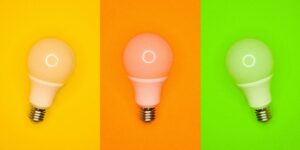5 Reasons Why Your LED Light Bulbs Are Burning Out
Posted by Emma Reid on 7th Dec 2021

One of the biggest selling points of LED bulbs is their massive lifespans, but what should you do if you find yours are burning out before their time?
LED bulbs are expected to last from anywhere between 15,000 to 50,000 hours in ideal circumstances, which makes them amazing value for money. However, there are a few situations that can prevent your LED bulbs from reaching that maximum lifespan, which we’re here to illuminate!
1) Using The Wrong Dimmer Switches
One of the most common reasons that LED bulbs burn out quickly is when they’re used in incompatible dimming circuits.
Firstly, remember that LED bulbs aren’t dimmable by default. While you can use dimmable LED bulbs in non-dimmable circuits, the reverse is not true, so check before you install a new bulb.
Secondly, older leading-edge dimmer switches aren’t designed with the low wattage requirements of LEDs in mind. Swap to a trailing edge dimmer switch instead.
Thirdly, dimming circuits can be fussy in terms of their minimum and maximum load, causing burn out. Make sure you’re not over or underloading your switch and your bulbs will last much longer.
If you want to check the maximum number of bulbs you can use, just take the maximum wattage of the switch and divide it by the wattage of the bulbs you want to use.
Check out our range of LED dimmer switches and consult with an electrician to get your dimming circuits LED ready!
2) Overheating
LED bulbs don’t generate as much heat as other bulbs, but that does mean they can be a little sensitive to overheating. This can cause them to burn out too quickly. Keep your bulbs cool and they’ll last longer.
Firstly, ensure the bulbs you’re using aren’t too big for the fitting. Just because the base fits, doesn’t mean you should use that bulb! If you have enclosed fittings, make sure the bulbs you use are compatible.
On top of this, make sure you aren’t exceeding the maximum wattage of the light. This is a less likely culprit with LEDs, since they require so little power. Still, as low-energy lights become more popular, more fittings are lowering their maximum load to match, so it’s good to check.
If you’re using recessed LED downlights you need to make sure they’re not covered by insulation, as this will block air flow. The Integral Evofire IP65 White Fire Rated Downlight With GU10 Holder And Insulation Guard is a good option.
3) Bad Connections
When using E14 or E27 bulbs in particular, make sure they’re not screwed in too tightly or too loose. If it’s too loose, you just need to give it an extra twist to ensure the contact points are secure.
If you’ve screwed the bulb in too tightly you could have accidentally compressed the socket tab. Check the metal tab in the socket. If it’s not sat at a 20-30° angle, then you can either replace the fitting, or use a pair of pliers to bend the tab into place. Make sure you turn off the power at the breaker before doing this.
If the fitting is older, then the connection points may have been worn down over the years, in which case it’s time to get a new one.
4) Home Voltage Is Too High
If all your bulbs are burning out too quickly, or they’re brighter than they should be, then there could be a problem in your mains power supply. In the UK, this should be around 230v at 50Hz, any more than this will cause any bulb to burn out quickly, not just LEDs.
If you suspect this to be the issue, get in touch with a qualified electrician to test the voltage and contact your electricity provider.
5) A Bad Batch
There’s always a small chance that a bad light bulb could slip through quality control, or become damaged through transit.
If you’ve tried all the above fixes and have a bulb that’s still burned out, we have a 14-day return period to cover you. For long term peace of mind, our bulbs are covered by robust warranty policies, so you can be certain they’re built to last.
If you’ve got any more questions, then don’t hesitate to get in touch with us on 0116 321 4120 or send an email to cs@wled.co.uk.
You can also follow us on YouTube, Twitter, Instagram or Facebook.





